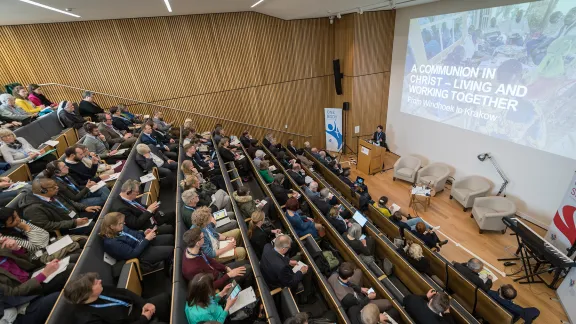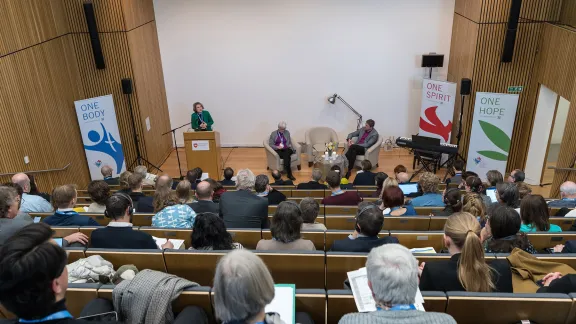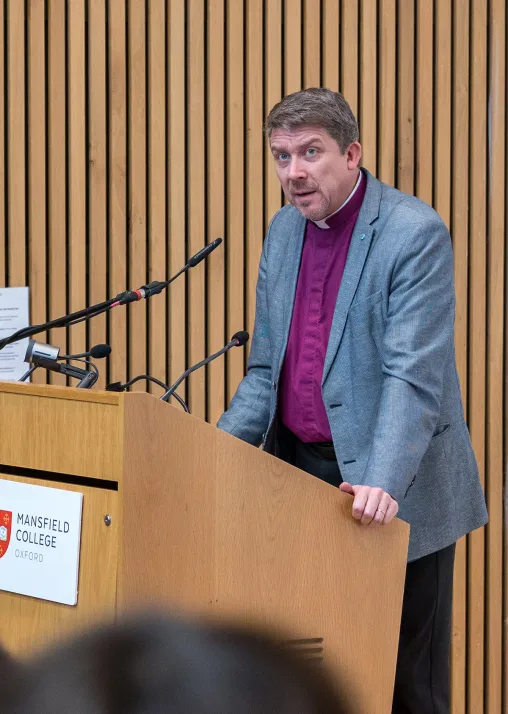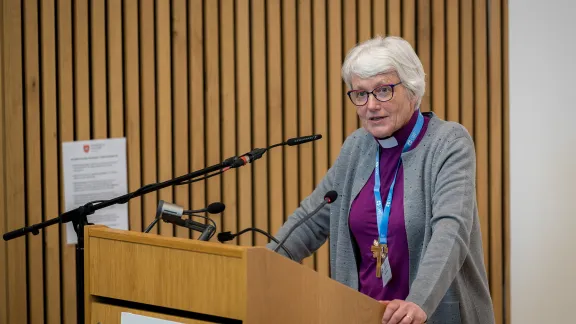LWF General Secretary Rev. Dr Anne Burghardt joins church leaders from the three European regions to reflect on progress and new challenges on the journey ‘from Windhoek to Krakow’

LWF General Secretary Rev. Dr Anne Burghardt addresses European church leaders gathered for their regional Pre-Assembly in Mansfield College, Oxford. Photo: LWF/A. Hillert
LWF General Secretary joins delegates from European regions reviewing journey ‘from Windhoek to Krakow’
(LWI) - The Lutheran World Federation (LWF) was founded in 1947 as “a peace project” that brought together churches in countries that had previously “been standing on opposite sides of the frontline.” Speaking at the first regional Pre-Assembly in Europe, where a new conflict has sparked the worst refugee crisis since the Second World War, LWF General Secretary Rev. Dr Anne Burghardt reflected on the role of the organization today, as it prepares for the Thirteenth Assembly in Poland in September.
In her message to delegates from the Eastern, Western and Nordic regions, Burghardt talked about the “four founding pillars” of the global communion of churches, which came together at the end of the war to promote joint efforts in theology, mission, Christian unity and refugee relief work. Alongside the urgency of responding to the plight of the refugees, she noted how church leaders, who had been on opposite sides of the conflict, were able to work together again because they had built friendships in pre-war times. “Never underestimate the importance of coming together,” she insisted.
Seventy-five years on, Burghardt told participants gathered at Mansfield College, Oxford, the LWF talks about those pillars in terms of “holistic mission and its different aspects of proclamation, worship, public witness and diakonia.” A key task facing Assembly delegates, she added, is “how to ensure a balance” between these four aspects of mission and how to “listen, to hear and understand the real questions and concerns” of people in their churches today.

Vice president for Western Europe Pröpstin Astrid Kleist addresses the Pre-Assembly alongside Professor Antje Jackelén and Archbishop Urmas Viilma. Photo: LWF/A. Hillert
Speaking about the diversity within and among the 149 churches that make up the communion, the LWF leader reflected on the relationship between their individual autonomy and the need for some form of mutual accountability. The process of developing such a “mutual accountability framework” is about to start, she said, supported by the LWF as “a super-connector between member churches.”
That diversity was reflected by the vice-presidents of the three European regions who reported on priorities for their churches in preparation for the 13 to 19 September Assembly. While they noted shared concerns around the climate crisis, the impact of the COVID-19 pandemic and declining church memberships, they also highlighted diverse perspectives on gender justice, sexuality and the instrumentalization of religion by political leaders.

Vice president for Eastern Europe Archbishop Urmas Viilma addresses the Pre-Assembly. Photo: LWF/A. Hillert
Estonian Archbishop Urmas Viilma, vice president for Eastern Europe, spoke about the war in Ukraine and the ongoing response of churches in his region to the refugee crisis. He also looked back at the theme of the previous Assembly in Windhoek, Namibia in 2017, noting how it pointed ahead to the emergence of climate justice as a top priority for churches across all the LWF regions.
At the same time, he continued, divisions over identity and gender are creating new tensions, while declining membership in most churches in the region raise questions over the role and mission of Christians in an increasingly secular society.

Archbishop Emerita Prof. Antje Jackelén, vice president for the Nordic region, addresses the Pre-Assembly. Photo: LWF/A. Hillert
The “pushback against women’s rights is often legitimized by faith leaders who are instrumentalized to promote oppression and discrimination.”
– Nordic vice president Archbishop Emerita Antje Jackelén of the Church of Sweden
Pröpstin Astrid Kleist, vice president for Western Europe region, spoke of the pandemic as “a turning point” for churches, especially concerning their pastoral work with people suffering from anxiety and mental health issues. The pivot to online worship and ministry opened new possibilities, she said, but it also highlighted the persistent digital divide.
Kleist highlighted recent progress for women in the ordained ministry in countries such as Poland and the Holy Land, while also lamenting the decision to stop ordaining women in another European member church. “We need to talk about gender justice in our churches,” she stressed, noting that the LWF’s Gender Justice Policy turns ten years old this year. As members of the one body of Christ, she said, “we must not give up on each other, but rather "be joyful in hope, patient in affliction and faithful in prayer [Romans 12:12].”
The Nordic vice president, Archbishop Emerita Antje Jackelén of the Church of Sweden, also spoke of the “pushback against women’s rights, often legitimized by faith leaders who are instrumentalized” to promote oppression and discrimination. She pointed to ethical challenges raised by the development of artificial intelligence “which raises concerns around integrity and democracy,” as well as concerns around job losses and social unrest.
General Secretary Burghardt urged European church leaders to continue reflecting with their congregations on the theme of the Thirteenth Assembly, ‘One Body’ One Spirit, One Hope’ with the help of the Assembly Study guide. After reviewing developments in many areas, including youth empowerment, leadership training, the strengthening of LWF advocacy and ecumenical cooperation, she concluded: “Hope is the experience of God’s Spirit that compels us to bridge the gap between the all-encompassing peace and justice God has promised and the reality of the world.”
The Thirteenth Assembly of the Lutheran World Federation takes place 13-19 September 2023 in Krakow, Poland. The theme of the Assembly will be "One Body, One Spirit, One Hope." It will be hosted by the Evangelical Church of the Augsburg Confession in Poland.


